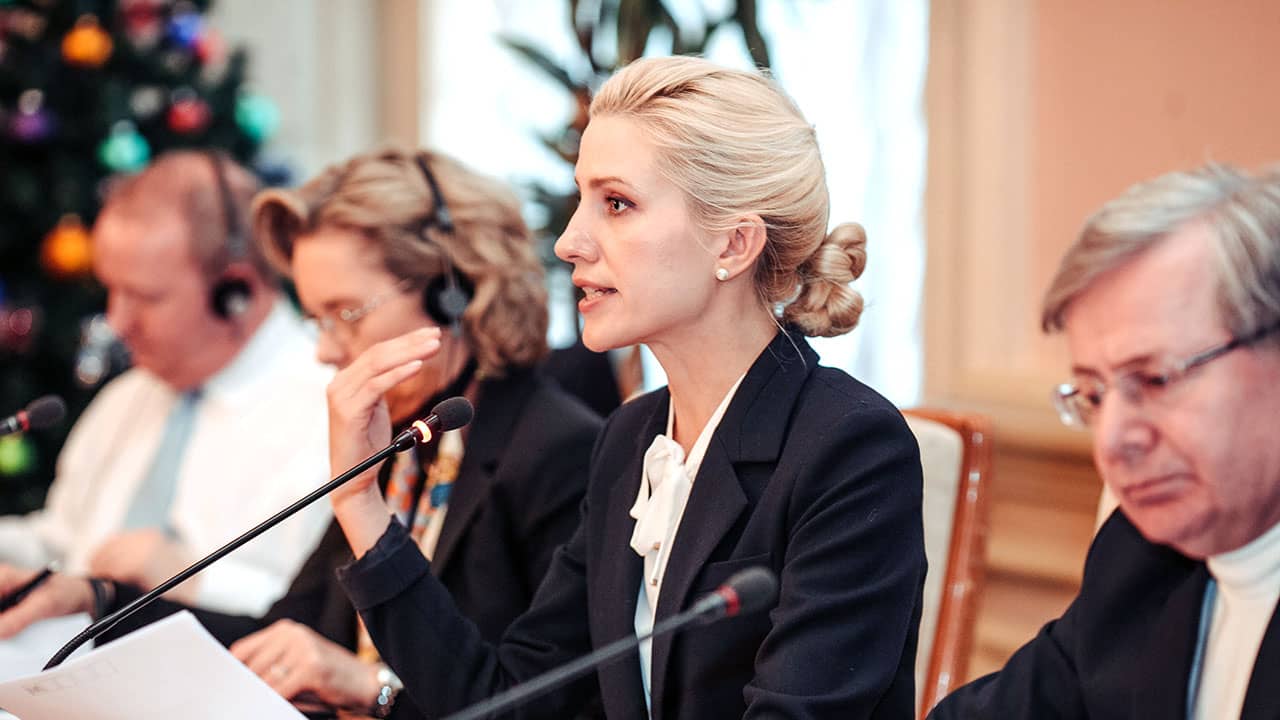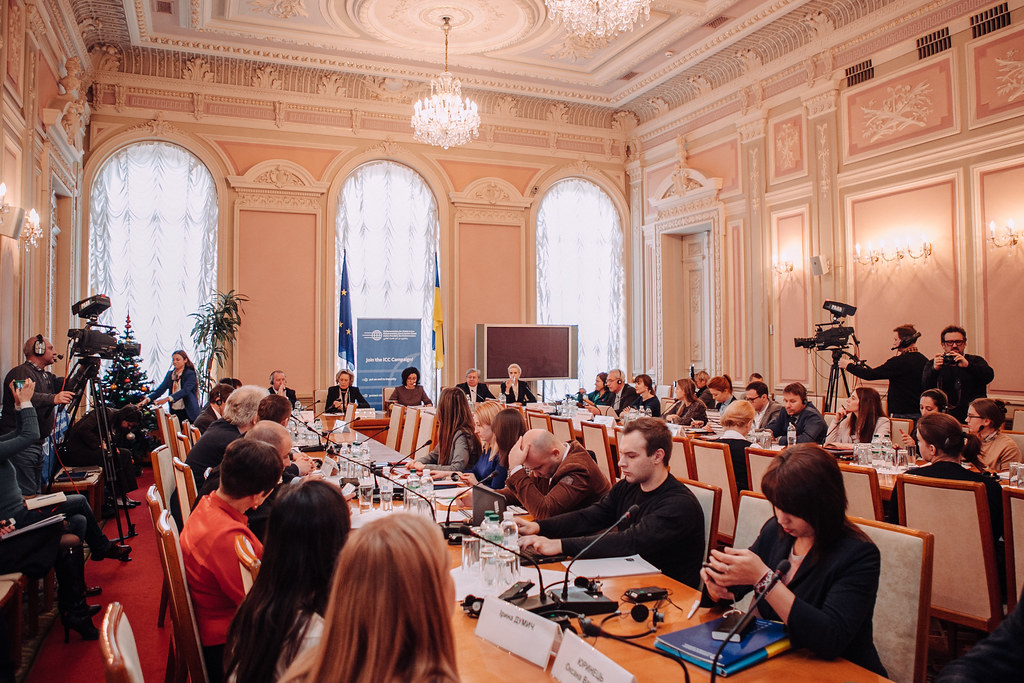
Ahead of the Parliament of Ukraine (“Verkhovna Rada”)’s vote on the proposed constitutional amendment to allow for ICC jurisdiction under Article 124 of the Constitution of Ukraine, a precondition for Rome Statute ratification, PGA held a Parliamentary Seminar on the International Criminal Court (ICC) and the Protection of Civilians in the Verkhovna Rada on 15 December 2015.
The meeting was held under the high patronage of the Chairman of the Verkhovna Rada Hon. Volodymyr Groysman, MP and the Deputy Speaker (the first ever woman in this position in Ukraine) Hon. Oksana Syroid, MP, welcomed the participants with her opening remarks. The objective of this seminar was to address and overcome existing fears and potential obstacles towards ratification and effective implementation of the Statute. Ukraine has already accepted twice, ad hoc, the jurisdiction of the ICC concerning alleged crimes committed in the territories of Ukraine in the last two years.
PGA works with its 26 Members, Ukrainian legislators, in support of the political transformation of Ukraine towards human rights and the Rule of Law, and has supported its members in the Constitutional Commission (an advisory board to the President of Ukraine including MPs and other stakeholders with no legislative power) and in the relevant Committees of the Rada (Legal Policy and Justice, Foreign Affairs Committee, Human Rights and European Integration Committees) in working towards amending Art. 124 of Ukraine’s constitution to include a sentence allowing for ICC jurisdiction.
The package to amend the constitution regarding the parts on justice and the Judiciary has been submitted by the Constitutional Commission to the President of Ukraine in an advisory draft in mid-2015: The President then submitted it to Parliament at the end of November 2015, but it included a “transitional provision”, which would only allow the entry into force of the new text of Art. 124 and, as a consequence, the ratification of the Rome Statute ratification 3 years after the adoption of the revised text of Art. 124 itself.
PGA has therefore arrived in Ukraine at a crucial moment and has been working with its Members and local stakeholders, including members of the civil society conglomerate called “Human Rights Agenda”, to support the amendments while excluding this transitional provision since all Members of Parliaments and experts met by the PGA Delegation have agreed that ratification shall take place as soon as possible, without any undue delay apart from the necessary time-line to fulfil the Constitutional revision.
The seminar was attended by Members of the Verkhovna Rada, MPs from Austria, Sweden and the United Kingdom, as well as high-level representatives and experts from Estonia, the Kingdom of the Netherlands, the EU, the OSCE, ICC, the judiciary, academia, and civil society. The Seminar was further honored by the attendance of the Deputy Minister for Foreign Integration, Mr. Sergiy Pethukov, who also received the PGA Delegation at the Ministry of Justice for further consultations.
The PGA Executive Committee was represented by its Treasurer, Hon. Margareta Cederfelt, MP (Sweden), Rapporteur of the OSCE PA's General Committee on Political Affairs and Security, Hon. Mark Pritchard, MP (United Kingdom), Member of the PGA International Council and Hon. Petra Bayr (MP Austria), the incoming PGA Treasurer.
The seminar was opened by Deputy Speaker of the Verkhovna Rada, Ms. Oksana Syroid, MP, who welcomed participants and touched on how Ukraine’s lack of legislation in this respect serves to further delay full Rome Statute ratification. Her comments were followed by PGA treasurer, Ms. Margareta Cederfelt, MP (Sweden), who agreed in stating that Rome Statute ratification is one of the strongest protections against further crimes against humanity.
The seminar continued on with a panel discussion on violations of International Law in Crimea and Donbass in view of the ICC and the obstacles faced by Ukraine towards full rratification, in which member of PGA, Mr. Mark Pritchard, MP (United Kingdom), declared that this issue must come to the Parliament floor, saying ratification is a judicial forum that is not competing with Ukrainian courts, but instead complementing them.
Prof. Victor L. Musiyaka, Deputy Chair of the Constitutional Commission of Ukraine, informed participants in his keynote remarks that miscommunications on what ICC ratification would look like must be cleared up in Parliament in order to move forward with the full ratification process.
The Chairperson of the subcommittee on Euro-Atlantic cooperation and Euro-integration of the Verkhovna Rada of Ukraine Committee on Foreign Affairs, Ms. Svetlana Zalishchuk, MP, underscored Ukraine’s obligation to ratify the Rome Statute, both as a country which values basic international standards and principles of justice, but also because of the association agreement signed with the European Union. She added that the role of domestic justice should not be underestimated, and ratifying the Statute would only underscore this point.
Mr. Matias Hellman, External Relations Adviser at the Office of the Presidency of the ICC, made several points on the role of the ICC Prosecutor, and underscored the fact that the ICC is a court of last resort, acting only when justice cannot be achieved in national courts.
During the question and answer period, PGA Secretary General Dr. David Donat Cattin described Ukraine’s “transitional provision” as unusual and atypical, given that none of the States that amended their constitution to ratify the Rome Statute (e.g. France, Portugal and Brazil) did so with a clause that postponed the entry into force of the amendment. He also stressed that it is not in Ukraine’s advantage, as far as protecting Ukrainians’ rights are concerned, to have such an unnecessary and unhelpful delay.
The second panel was a jurisdictional overview of the crime of aggression and its correlation to war crimes, crimes against humanity, and genocide. The Deputy Permanent Representative of the Permanent Mission of Estonia to the UN, Amb. Minna Liina Lindt reiterated Estonia’s support for the ICC and the UN system, underscoring the importance of properly defining and addressing the crime of aggression, which reinforces the prohibition of unlawful use of force contained in the UN Charter.
Prof. Mykola Gnatovskyy, Chair of the European Committee for the Prevention of Torture and Inhuman or Degrading Treatment, highlighted the fact that the ICC has a role to play in post-conflict settlement, but also stressed that joining the Rome Statute system would have a preventative value that would be beneficial for Ukraine. He highlighted the existing internal norms of International Criminal Law that are already applicable in the domestic Ukrainian system, including the crimes of genocide and aggression and most war crimes. Incorporation of crimes against humanity could be finalized in a relatively short time-frame, via the adoption of an ordinary law, Prof. Gnatovskyy concluded. The academic underscored that a three years postponement of ratification would not be necessary to fully implement the Rome Statute in the domestic legal order.
The Parliamentary Committee on Legal Policy and Justice was represented by Mr. Dmitry Storozhuk, MP, who had received the PGA Delegation in a separate meeting on behalf of the Freedom Party (Narodny Front). The Legislator stated that the way forward to address the risk of delays in ratification is reaching a compromise among parliamentarians, and he undertook the commitment to try to resolve the problem caused by the “transitional provision” in his Committee, which is in charge of the Constitutional revision process.
In a strong declaration, PGA (incoming) Treasurer Ms. Petra Bayr, MP (Austria), stated that only full Rome Statute ratification can have a strong unequivocal deterrent effect against future perpetrators of international crimes. Participants compared the advantages of ratification vis-à-vis ad hoc acceptance of jurisdiction, which imposes on Ukraine the obligation to cooperate with the ICC but does not afford Ukraine the same rights that States Parties have, including the right to refer a situation to the Court’s Prosecutor and to have nationals hired in the top positions of the ICC structure.
In his closing remarks, Amb. Jan Lucas van Hoorn, Ambassador of the Kingdom of the Netherlands to ICC and Int. Organization in The Hague, underlined that The Netherlands are taking its obligation as host city of the ICC very seriously and are looking forward to welcoming Ukraine to the group of nations fighting for no impunity for international crimes.
The discussions provided for a useful opportunity to overcome any misconceptions that parliamentarians had about the ICC and underscore the advantages of being part of the Rome Statute system in the fight against impunity. The PGA delegation also had the opportunity to meet with several political fractions leading up to the seminar, in which PGA had a chance to have bilateral conversations with those MPs that were not able to attend the Seminar due to their schedules. Those meetings were extremely useful to receive first hand information from MPs on the issues discussed around the ICC within each political fractions members.
On Parliament's Official Website:
- Verkhovna Rada of Ukraine holds international seminar on International Criminal Court and prospects of Rome Statute ratification (Dec. 16, 2015)
- Deputy Chairperson of Committee on Legal Policy and Justice Serhii Alekseyev meets representatives of "Parliamentarians for Global Action" International Network (Dec. 15, 2015)
In Ukrainian Media:
- Will the annexation of the Crimea and killing of civilians in the Donbass be considered as crimes in the Hague? An expert explains: Ukrainian | English - Amnesty International Interview with PGA Secretary General (HB, Dec. 25, 2015)
- Will Ukraine to turn to an international court to investigate crimes against humanity? (The Voice of Ukraine, Dec. 15, 2015) “Future steps to Ukraine on the way to ratification of the Rome Statute of the International Criminal Court (ICC) were discussed yesterday in Parliament to exchange experiences between experts and parliamentarians on the ICC and civil protection in collaboration with the Parliamentary Committee on Legal Policy and Justice, European Integration and Foreign Affairs. The event was attended by parliamentarians and lawyers from Ukraine, Austria, Sweden, the UK, Estonia, the Netherlands and the EU, the OSCE and the ISS, experts on the judiciary, academics, representatives of civil society…"
- Deputy Chairman of the Committee on Legal Policy and Justice Sergey Alekseyev participated in meetings with representatives of international organizations << parliamentarians for global action (Voice of Ukraine Dec. 15, 2015)
- Foreign parliamentarians urge Ukraine to immediately and fully ratify the Rome Statute (Prostir, Dec. 15, 2015) [Ukr]
- Foreign parliamentarians put pressure on Ukraine to ratify the Rome Statute (ukrpohliad, Dec. 15, 2015)
- Foreign parliamentarians urge Ukraine to immediately and fully ratify the Rome Statute (Politikan, Dec. 15, 2015)
- Will Ukraine turn to an international court to investigate crimes against humanity? (Voice of Ukraine, Dec. 15, 2015) [Ukr]
- In no BP 300 votes on accepting the jurisdiction of the International Criminal Court - Deputy Speaker (Ukrainian National News UNN, Dec. 15, 2015)
- The deputies could not approve the amendments to the Constitution regarding the ratification of the Rome Statute: Not enough votes (4esno, Dec. 15, 2015)
- If Ukraine ratifies the Rome Statute, it proves that it is an adult and mature international player – experts (Ukraine Crisic Center, Dec. 15, 2015)
Press Conference [in English]
- For Ukraine, the Rome Statute ratification means coming of age internationally. It defines whether the country is mature enough in terms of international law – experts (Ukraine Crisis Center, Dec. 15, 2015) [English]
- Video: Forget about The Hague: Ukraine delays Rome Statute ratification. UCMC-15-12-2015 [English]
In Ukrainian Radio:
- The ratification of the Rome Statute, which fears has the Ukrainian government? (Public Wave, Dec. 16, 2015 )

